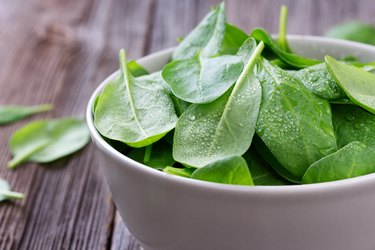
Most people require between 10mg and 15mg of iron per day. If you have diabetes, getting proper amounts of iron in your diet is important. According to The Journal of Clinical Endocrinology & Metabolism, anemia, or iron deficiency, is a considerable risk for those who have Type 1 or Type 2 diabetes. In order to ensure your iron levels remain healthy, regularly incorporate iron-rich foods into your diet. Many foods that contain iron are nutritious in other ways, providing enhanced wellness and lower risk of iron deficiency.
Legumes
Video of the Day
According to the University of Maryland Medical Center, legumes such as kidney beans, lima beans, pinto beans and canned white or baked beans are good sources of iron. They're also low in fat and contain lean protein, fiber and other nutrients that support healthy blood sugar as well as overall wellness. One-half cup of beans is considered one serving size, or one cup of bean-based soup. Incorporate a variety of legumes as part of your regular diet for best results. They are a versatile food group, so if you enjoy cooking, incorporate them into your standard recipes in place of high-fat red meat or processed meats, such as sausage. If you're vegetarian, legumes are an excellent meat-free protein food choice.
Video of the Day
Leafy Greens
Leafy greens such as spinach and kale are a positive source of iron with an array of alternate vitamins and minerals. One-half cup cooked spinach contains approximately 2mg iron, which is comparable to some cuts of beef and pork, the McKinley Health Center says. Incorporate greens into salads and cooked entrees, seeking an assortment of types and colors. The deeper the color, the more nutrients the greens tend to have. If the darkest greens aren't as sweet tasting as you'd like, shred and mix them with other greens.
Enriched Whole Grains
Whole grain breads and cereals are often enriched with nutrients, including fiber. Some bran-based cereals contain between 12mg and 24mg iron per serving, says Jackson Seigelbaum Gastroenterology. Oat-based cereals are also good sources of iron, as are whole or multi-grain breads. Whole grains are less damaging to blood sugar levels and provide an array of nutrients that can support physical wellness, including healthy iron management. Enjoy grain-based foods as a part of healthy, balanced meals that are easy on your blood sugar.
Low-fat Dairy Products
Low-fat dairy products provide good amounts of iron as well as lean protein, calcium and vitamin D. They're low in saturated fat and can help support healthy blood sugar levels. Consider low-fat milk, yogurt and cottage cheese as a part of your overall healthy-eating regimen. One serving is equivalent to 1 cup milk or yogurt or 1/2 cup low-fat cottage cheese.